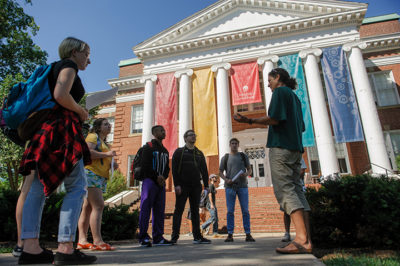The University of Lynchburg today announced that it will lower tuition for Fall 2021-22 from about $54,000 to a total price tag of just under $46,000. Factoring in the institution’s generous financial aid and scholarships, students will pay about $24,000 a year on average, which compares with most public universities in Virginia.

Dr. Alison Morrison-Shetlar, president of the University of Lynchburg, said the refresh is an innovative approach to the ever-increasing cost of a college education and “the right thing to do” at a time when families across the country are struggling to afford a quality college education.
“Tuition everywhere has been escalating for years, and many families fear that a university degree may be out of reach — especially now in such uncertain economic times,” Morrison-Shetlar said. “For some time now, we have wanted to do something to ensure students everywhere have access to a high-impact, private education they can afford. We are a student-first university, and this is the best thing for our current and prospective students.”
For several years, the University of Lynchburg has been looking at ways to address the challenges families face due to annual tuition increases. The arrival of the pandemic and the uncertain economy of the past several months made this decision more timely.
“As a result of this innovative change to our cost of attendance, we expect that Lynchburg will be more attractive to students, regardless of their socioeconomic backgrounds,” Morrison-Shetlar said. “And, we are certain that this tuition refresh will further enhance our reputation as one of the ‘Colleges That Change Lives.’”
The new cost of attendance of $45,900, down from $54,018, represents the total cost to attend for a year, including tuition, fees, and room and board. The average net price of about $24,000 is calculated after need-based financial aid and merit scholarships are factored in.
To simplify matters, with the tuition refresh, general student fees will be included in the overall tuition price. Financial aid packages for returning students will be adjusted accordingly to ensure that they will not be subject to tuition increases in the coming year. All returning Lynchburg students will pay the same tuition next year as they paid this year.
“Without this refresh, our tuition would have increased again this year by about 3%,” Morrison-Shetlar said, noting a practice of yearly increases that has been employed by most colleges and universities. “However, we want to make sure that everyone who is seeking a high quality, affordable education that will lead to graduate school or a job, can navigate the economic effects of this pandemic. We just don’t know what will happen in the next several months. So, we want our students and their families to know exactly what they can expect to pay for their education so they may plan accordingly.”
It’s an investment the University is well-positioned to make following a balanced budget for 2020, according to Vice President for Finance Steve Bright.
“Despite the pandemic, we’ve been able to keep our campus whole through diligent planning and careful financial management,” Bright said. “We’ve been able to keep our students safe and on campus, and keep everyone employed. While it’s an investment in the short term, this tuition refresh is the right thing to do at a time when many families are struggling, and it will make the University stronger and better in the long run.”
“Increasingly, students who attend Lynchburg also consider public universities because they perceive them as less expensive,” said Rita Detwiler, vice president for enrollment management. “With our price refresh, we’ve better positioned the University of Lynchburg to succeed in a very competitive higher education marketplace. Now, a student can get the signature Lynchburg experience at the same price as a state school.”
It’s critical students file their FAFSA as soon as possible to take full advantage of all federal aid available, Detwiler added.
More about the new tuition pricing is at lynchburg.edu/refresh.

